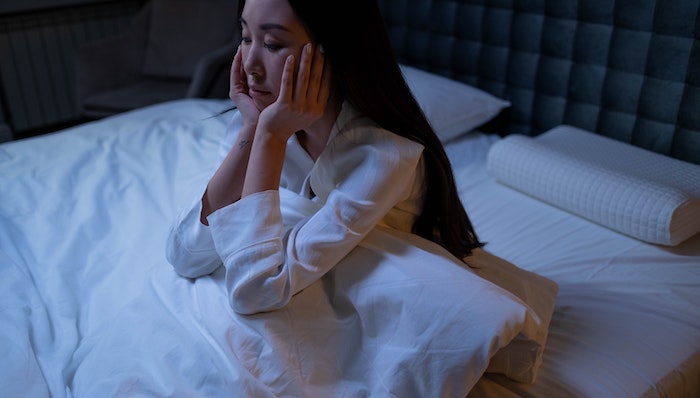Are Your Hormones Wrecking Your Sleep?
How to optimize your sleep during perimenopause and menopause.
Sleep is a cornerstone of your health. If you’ve ever been sleep deprived for any number of reasons you’ve experienced how it’s fundamental to your physical, mental, and emotional health. Yet, many women experience significant sleep disturbances during the transitional phases of perimenopause and menopause, sometimes starting as early as their early 40’s Because estrogen and progesterone are bouncing around so much during this time, women commonly get muscle and joint pain, hot flashes, and night sweats along with psychological factors like anxiety that interfere with sleep.
If you resonate with any of these issues, we will delve into why women struggle with sleep during these life stages, and we’ll explore strategies to promote better sleep quality.
Before we dive into the details, let’s understand the phases involved:
Perimenopause typically starts in a woman’s 40s but can begin earlier for some. It’s characterized by irregular menstrual cycles and hormonal fluctuations, leading to symptoms such as hot flashes, night sweats, weight gain, mood changes, and sleep disturbances.
Menopause is defined as the point when a woman hasn’t had a menstrual period for 12 consecutive months. It marks the end of the reproductive years and is usually accompanied by more stabilized hormonal levels, but not the end of the symptoms such as hot flashes. After menopause, women make little to no progesterone and only small amounts of estrogen mostly in the form of estrone created from fat.
Estrogen and progesterone, the two key hormones in a woman’s reproductive cycle, play a significant role in sleep regulation. Especially in the last years leading up to menopause,
hot Flashes and night sweats worsen and become more frequent. Estrogen helps regulate body temperature via the hypothalamus in our brain which is responsible for thermoregulation in the body. These sudden temperature changes can jolt women awake in sweat, interrupting their sleep, and making it hard to fall back asleep.
Sleep Architecture Changes
Hormonal fluctuations can impact the structure of sleep itself. Women may experience lighter and more fragmented sleep. Sometimes difficulty falling asleep but more commonly middle of the night or early morning awakening. Rapid Eye Movement (REM) sleep, the stage associated with dreaming and cognitive restoration, can also be affected.
Physical Discomfort
Feeling like your 80 years old overnight is common! Often increases in joint pain and muscle tenderness cause tossing and turning at night, just trying to get comfortable. Drops in estrogen can make the tendons and ligaments less pliable, and some research says pain threshold lowers as well. Couple this with more inactivity, weight gain and non-restorative sleep and it’s a vicious cycle.
Stress, Anxiety and Depression
The hormonal changes and life adjustments that accompany perimenopause and menopause can lead to heightened stress and anxiety. Progesterone is a calming hormones, often called “Nature’s valium” and because it drops earlier in perimenopause, anxiety is a common complaint. Couple this with typical burdens of middle age- empty nest, possible divorce or separation, aging parents and financial concerns about retirement, women have a lot on their minds. There are many estrogen receptors on the brain than play a role in brain health and mood, and estrogen helps modulate serotonin. Statistics show that women in the perimenopausal early menopause have more depression. All of this can create struggles around sleep.
I know this all sounds bleak but wait! There are strategies that you can use to ease the transition in perimenopause and menopause to optimize your sleep. Follow these suggestions and you can be sleeping like a teenager.
1. Sleep train like a baby.
This is not the time to compromise. Make sure you pick a time to go to sleep every night and stick to it. Also make sure you are waking at the same time. Yes, even on the weekends. Going to bed and waking up at the same time every day helps regulate the body’s internal clock which helps keep your sleep cycle consistent. It may be hard at first but overtime you will learn to love it.
2. Create a restful sanctuary.
- Do you need to change the wall color make things more soothing? Make sure that you don’t have LED lights blinking from devices in your room and use black out curtains to create a dark environment. Wear an eye mask if necessary.
- If you have a TV in your bedroom, remove it. Sleep and TV do not mix- ever. Also, if your room is cluttered, or you have a desk with work papers and bills piled up, it’s time to find a new home for these things too. This just signals stress. Bedrooms are for sleep, cuddling, some relaxing activities like reading and of course sex, period.
- Invest in a new mattress and new pillow to support this stage of life.
- Invest in some new comfy nightwear that is breathable and soft.
- Turn down the thermostat. If hot flashes are plaguing, you, make it chilly. 67 degrees is ideal for sleep. Fans help too. You can even invest in a cooling system for your bed. I like the Bed jet system.
- Does your partner snore? Consider earplugs.
3. Give yourself a chill down hour.
It’s so important to transition to sleep with some calm self-care time. Engaging in calming activities before bed, can signal to the body that it’s time slumber.
- Create a no screen zone. Yep – no phone, TV, tablet etc. 60 minutes before bed. That includes email, Netflix, Instagram, games etc. Kindle readers are fine, but I still recommend blue light blocking glasses with those too. Instead read an old-fashioned paper book.
- No exercise. This is not the time to hop on the Peloton. It will invigorate you, not make you tired. If you must exercise at night make it at least 3 hours before sleep.
- Release the stress of the day with some relaxing journaling, a few stretches or yoga poses or a nice body scan meditation in bed.
- Use some aromatherapy to relax you by putting essential oils in an atomizer to make your room smell like as spa. Lavender is great for this.
4. Move your body throughout the day: Being sedentary most of the day makes it hard to fall sleep.
Studies show that exercisers sleep more soundly, so try to take exercise breaks throughout the day. Leave your desk, take the stairs, do a few squats or jumping jacks or walk around the block. It all adds up.
5. Use food for sleep: What you eat and when can make or break your sleep.
- Nix stimulants as much as possible. Caffeine is not used after noon. Even if you fall asleep it can still cause mid night awakenings. Try to limit coffee to 1-2 less than 8-ounce servings.
- Avoid alcohol completely. It sabotages your sleep cycle, increases blood sugar which later crashes and metabolizes into a stimulant. It also worsens hot flashes.
- Keep your nighttime meal 3 hours from sleep and avoid hard to digest meals and sugar which can also interfere with sleep.
- Have some herbal tea like valerian, hops, lemon balm before bed. Tart cherry juice can help soothe achy muscles too.
6. Herbs and medications:
- Hormone replacement therapy like oral progesterone can be very helpful for sleeplessness, and when ready bioidentical estradiol will help with those hot flashes along with many other symptoms.
- Adaptogens such as Ashwagandha, black cohosh and evening primrose can be great for menopausal symptoms.
- Magnesium Glycinate or Threonate, pharma GABA and low dose melatonin are also tools for sleeping more soundly.
Sleep disturbances during perimenopause and menopause are common but not insurmountable. By prioritizing sleep hygiene, adjusting your lifestyle and seeking medical advice, when necessary, you can start sleeping better.





